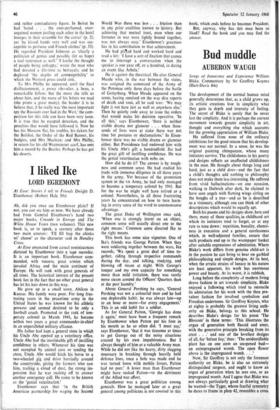At Ease: Stories I tell to Friends Dwight D. Eisenhower
(Robert Hale 50s)
I liked Ike
LORD EGREMONT Ah, did you once see Eisenhower plain? If not, you can see him so now. We have already had from General Eisenhower's hand two major books, Crusade in Europe and The White House Years (two volumes). This new book is, so to speak, a savoury after those two main courses : 'I'll fill hup the chinks wi' cheese' as the character said in Handley Cross.
At Ease emanated from casual reminiscences dictated by Eisenhower into a tape recorder. It is an important book. Eisenhower com- manded, with success, great armies which invaded Africa and the main continent of Europe. He will rank with great generals of all times. The historical interest of the present book lies in the fact that no other great general has let his hair down in this way.
He grew up in a small town, Abilene in Kansas. His family were poor. For long frus- trating years in the peacetime army in the United States he was known for his athletic prowess and seemed destined to be only a football coach. Promoted to the rank of tem- porary colonel in March 1941, he became within two years a great commander-in-chief in an unparalleled military alliance.
His father had kept a general store in which his Uncle Abe opened up a veterinary office. Uncle Abe had the inestimable gift of instilling confidence in others. Whenever his time was not occupied by animal care or tending the store, Uncle Abe would hitch his horse to a two-wheeled gig and drive hurriedly around the countryside, giving the farmers who saw him, trailing a cloud of dust, the strong im- pression that he was rushing off to answer another emergency call. He came to be known as the 'genial veterinarian.'
Eisenhower says that In the British American partnership for waging the Second World War there was less . . . friction than in any prior coalition known to history. But achieving that mutual trust, even when our fortunes in war were tightly bound together, was not always easy.' Eisenhower's greatness lies in his contribution to that achievement.
He had plied hard and worked hard and read a lot : 'I have a sort of fixation that causes me to interrupt a conversation when the speaker is one year off, or a hundred, in dating an event like Arbela.'
He is against the theatrical. He cites General Meade who, in the war between the states, was assigned the command of the Army of the Potomac only three days before the battle of Gettysburg. When Meade appeared on the scene, having received on the way dire reports of death and rout, all he said was : 'We may fight it out here just as well as anywhere else.' Then he quietly rode away to issue the orders that would make his. decision operative. 'In all this,' says Eisenhower, 'there is neither visible drama nor glamour . . . when thou- sands of lives were at stake there was not time for postures or declamations.' In Eisen- hower there was no visible drama or glamour either. But Providence had endowed him with his Uncle Abe's gift a hundredfold. Ike had the great gift of instilling confidence. He was the genial veterinarian with nobs on.
How did he do it? The answer is by tough- ness and common sense. He had studied his trade with immense diligence in all those years in the army. Yet because of the promotion system in the us Army, he had only managed to become a temporary colonel by 1941. But for the war he might well have retired as a colonel. Nevertheless, in all those frustrating years he concentrated on how to turn learn- ing in every sense of the word to commonsense advantage.
The great Duke of Wellington once said, 'When one is strongly intent on an object, common sense will usually direct one to the right means.' Common sense directed Ike to the right means.
This book has some nice vignettes. One of Ike's friends was George Patton. When they were soldiering together between the wars, Ike records, 'We spent a great deal of time to- gether, riding through respective commands during the day, and talking, studying, and blowing off steam at night. With George's temper and my own capacity for something more than mild irritation, there was surely more steam around the Officers' Quarters than at the post laundry.'
About General Pershing he says, 'General Pershing was not a colourful man and he had one deplorable habit; he was always late—up to an hour or more—for every engagement' This is an odd habit for a soldier.
As for General Patton, 'Georgie has done it again,' must have been a frequent remark by Eisenhower when Patton put his foot in his mouth as he so often did. 'I must say,' says Eisenhower, 'that it was tiresome at times to get George out of the noisy situations created by his own impulsiveness. But I always thought of him as a valuable Army man. While he did not like the heavy, dirty slugging necessary in breaking through heavily held defence lines, once a hole was made and he was turned loose with mobile forces, Patton had no peer.' A lesser man than Eisenhower might have sacked Patton—to the detriment of the Allied war effort Eisenhower was a great politician among generals. How he managed later as a great general among politicans is not covered in this book, which ends before he becomes President. But, anyway, why has this man been so liked? Read the book and you may find the answer.






























 Previous page
Previous page